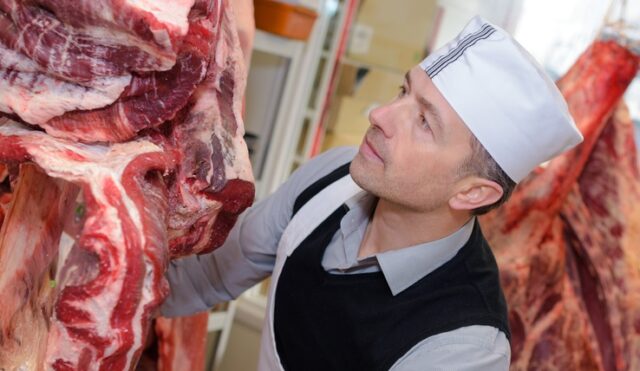Meat Inspector Registration
What you need to know about registering as a Meat Inspector.
Summary
- A meat inspector is a person qualified to inspect animals and meat to pass as fit for human consumption.
- In Victoria you must be registered with PrimeSafe to work as a meat inspector at a domestic abattoir.
- A meat inspector is also known as a meat safety inspector in the Australian Standard.
Become a registered meat inspector
The role of a meat inspector can be found in Section 8 of the Australian Standard for the Hygienic Production and Transportation of Meat and Meat Products for Human Consumption (AS 4696:2007).
To be registered as a meat inspector you must have a Certificate III in Meat Safety Inspection or equivalent.
You need to work as a meat inspector to keep your registration. You must have worked as a meat inspector in the last two years for your registration to be current.
If you stop working as a meat inspector for more than two years, you must do more training by completing the unit “Oversee compliance with the Australian Standards for meat processing”. This unit is part of the Certificate IV in Meat Safety Inspection course.
Your registration has to be regularly renewed. PrimeSafe sends out renewal notices before your registration expires.
How to apply to be a meat inspector
1. Complete the Certificate III in Meat Safety Inspection or equivalent.
2. Submit an application to PrimeSafe with copies of all relevant qualifications. You do this in the PrimeSafe Licensee portal.
3. Pay the $10 registration fee.
We will assess your application. If you meet the criteria PrimeSafe will enter into an agreement with you to be a “meat inspection service” in Victoria.
Meat inspection service agreement
The meat inspection service agreement requires you to:
- Carry out meat inspection services in accordance with the provisions of the Meat Industry Act 1993 and all relevant legislation, standards, regulations, codes, orders, notices, directions or quality assurance programs.
- Be independent and objective in the provision of the inspection services and ensure compliance by all persons with the Meat Industry Act 1993 and all relevant legislation, standards, regulations, codes, orders, notices, directions or quality assurance programs.
- Cooperate at all times and in all manner with all officers of PrimeSafe.
- Provide the inspection services in a productive manner with all due regard to protection of public health and product quality.
- Raise issues with the licensee/operator and, if the issue is not satisfactory resolved, reporting the matter to PrimeSafe if the processing rate or the rate of inspection required at licensed facilities is unreasonable.
- Keep and maintain all records required by PrimeSafe.
You must renew your registration to keep working as a meat inspector. PrimeSafe will send out renewals to meat inspectors six weeks before your registration expires.
Your registration lasts for up to three years. If this is the first time you are renewing your registration you might have to renew your registration before three years is complete. This is because all meat inspector registrations expire at the same time.
To renew your registration:
- Complete the Meat Inspector Renewal Application form in the Licensee Portal.
- Pay the renewal fee of $10.
PrimeSafe will give you a certificate of registration as a meat inspector. Give a copy of this certificate to your employer. Your employer must include the certificate in the facility’s quality assurance program.
We will assess your work experience using the information provided on your renewal form. If you have not worked as a meat inspector in the last two years we will send your renewal application back to you. You will then need to complete the training unit “Oversee compliance with the Australian Standards for meat processing” in the Certificate IV in Meat Safety Inspection course and then reapply.
Meat inspectors pay a $10 fee to register and then $10 to renew their registration every three years. There are no other fees and charges.
All PrimeSafe fees are GST exempt so we will not give you a tax invoice when you pay.
Standards and guidelines that apply
Use this standard when you are processing, transporting and/or storing meat and meat products for human consumption.

